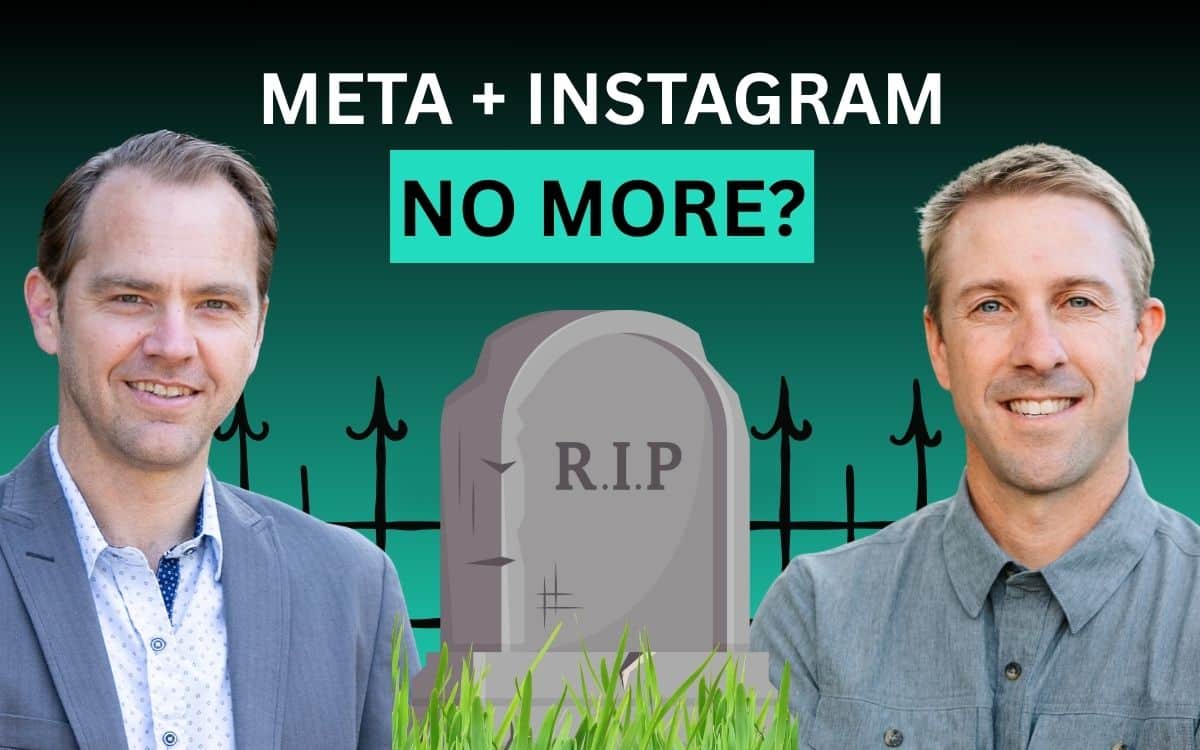Is Meta’s Social Media Empire at Risk?

In today’s episode, we’ve got some major news to dive into, starting with Meta facing a landmark antitrust lawsuit. The Federal Trade Commission (FTC) has filed a case against the tech giant, accusing them of monopolistic behavior by acquiring Instagram and WhatsApp instead of competing with them. This is big news because if the FTC wins, Meta could be forced to sell off these two massive social media platforms.
We’re also covering a Google lawsuit in the European Union, a study on AI traffic, and some surprising findings about LinkedIn engagement. We’ll round things off with some updates on side hustles and weird niche sites, including Spencer’s new pallet business.
Watch the Full Episode
The Meta Antitrust Trial
The big news today centers on the FTC’s lawsuit against Meta
. This trial could have massive implications for the tech industry, especially for Meta’s holdings in Instagram and WhatsApp. The FTC claims that Meta’s acquisition of these two companies was not a competitive move but an attempt to squash potential competition in the social media space.
Here’s what you need to know:
- FTC’s Allegations: The FTC argues that Meta did not acquire Instagram and WhatsApp because they were valuable or innovative but because Meta wanted to eliminate competition. According to the FTC, Meta saw these companies as future threats and bought them to control the market.
- Evidence from Mark Zuckerberg: The case is backed by internal memos and emails from Mark Zuckerberg, which show that Meta’s leadership thought it would be easier to acquire these competitors instead of competing with them directly.
- FTC’s Demand: The FTC is seeking to force Meta to sell Instagram and WhatsApp, a move that would dramatically affect Meta’s entire business model. Both platforms are essential to Meta’s social media empire, and this kind of disruption could change the landscape of digital marketing.
- Legal Challenges: Meta will likely argue that these acquisitions were legitimate and that the companies were not yet significant enough to be considered monopolistic threats. Instagram was still an emerging platform when Meta bought it in 2012, and WhatsApp, although large, was not the dominant player in messaging apps when it was acquired in 2014.
- What’s at Stake: If the FTC wins, it could set a precedent that impacts how tech companies acquire competitors. It would show that the government is willing to break up companies and challenge the way big tech has been operating for years.
This case is still in its early stages, but the outcome could have far-reaching consequences for Meta, the tech industry, and future antitrust cases.
Google Faces $6.6 Billion Lawsuit Over Search Advertising
Switching gears, let’s talk about Google, which is facing a $6.6 billion lawsuit in the European Union over its dominance in the search advertising space. A group of small businesses claims that Google has been using its market power to inflate the prices of search ads, forcing them to pay higher prices because they have no alternative.
Here’s what you need to know:
- The Allegations: The lawsuit argues that Google is using its monopoly to drive up prices for search advertising. Small businesses don’t have any other choice but to use Google’s ad services, and as a result, they’re forced to pay higher prices.
- Potential Consequences: While $6.6 billion is a huge amount of money, it’s not likely to hurt Google significantly. However, it’s important because it shows that regulators in the EU are serious about holding tech giants accountable. The case could also inspire other lawsuits in different countries.
- Why This Matters: If the lawsuit succeeds, it could have a ripple effect across the advertising industry, making it harder for Google to continue dominating the market. It could also encourage more businesses to seek alternatives to Google’s advertising network.
AI Traffic: 0.1% of the Internet’s Total Traffic
In other news, a recent study by Ahrefs examined the role of AI in web traffic. While AI is a hot topic these days, especially with the rise of tools like ChatGPT, the data shows that AI currently drives just 0.1% of total internet traffic. Here’s what we found from the study:
- The Small Impact of AI: Despite all the buzz, AI is still a small player in terms of referral traffic. AI traffic currently makes up just 0.1% of total traffic, with search engines still the dominant source of traffic at 43.8%.
- Other Traffic Sources: Direct traffic is also a major player, contributing 42.3% of the total, with social media bringing in 13.1%.
- Looking Ahead: While AI’s current role is small, the technology is still evolving. As AI tools like ChatGPT continue to improve, it’s likely that their impact on traffic will grow over time.
LinkedIn Surprises: Adding Links Boosts Engagement
One of the more surprising stories we covered this week is a study on LinkedIn, which revealed that adding links to your posts actually boosts engagement by 13%. For years, conventional wisdom has suggested that adding external links to LinkedIn posts would reduce their reach. However, this new study challenges that idea.

Here are the key takeaways:
- What the Study Found: Posts with links saw a 13.57% increase in interactions and a 4.9% increase in views compared to posts without links.
- What This Means for Marketers: If you’ve been avoiding adding links to your LinkedIn posts, it might be time to reconsider. The data shows that adding links can help increase engagement, potentially driving more traffic to your website or content.
- A Game Changer for LinkedIn Strategy: For businesses and content creators, this is big news. LinkedIn has long been a valuable platform for professional networking and marketing, and now it looks like you can add links without worrying about hurting your post’s reach.
Side Hustles Update
Spencer’s Liquidation Pallets PROJECT
On the business side of things, Spencer has been busy starting a new side hustle—buying and selling liquidation pallets. This is a business model where you buy pallets of returned items from major retailers like Walmart, Target, and Amazon, then sell the products individually for a profit.
- The Setup: Spencer is buying liquidation pallets from a nearby warehouse. He’s using his garage as a storage space for the goods and involving his kids in the process, helping them learn about business.
- The Work: The process involves a lot of sorting, photographing, and listing products online. It’s a lot of work, but Spencer is excited about the potential.
- The Challenges: While the business has potential, it’s also a lot of legwork. Spencer’s garage is currently filled with items that need to be sorted, and it’ll take time to get everything listed.
Jared’s Food Site UPDATE
As for me, I gave an update on my food website. While traffic has held steady, April’s ad revenue took a hit due to a drop in RPMs (Revenue Per Thousand Impressions). Here’s what’s been going on:
- Traffic Trends: Traffic remains stable, but RPMs have dropped significantly, likely due to the global economic uncertainty.
- What’s Next: I’m staying optimistic. With the summer months approaching, I’m hopeful that RPMs will bounce back, and things will improve as we get into the second half of the year.
Weird Niche Sites of the Week
Lastly, we always like to wrap things up by talking about some weird niche websites that have caught our attention: DetectFaceShape.com and EmailChecker.net
DetectFaceShape.com
This site uses AI to tell you what shape your face is. It gets over 1.7 million visitors per month and likely generates significant revenue through ads. This website is simple but clearly successful.
EmailChecker.net
A simple tool that verifies whether an email address is valid. Despite its basic functionality, it still gets 50,000 visits a month, though traffic has declined recently.
Final Thoughts
This week’s stories emphasize the growing scrutiny big tech companies are facing. The FTC’s lawsuit against Meta could reshape the social media landscape if they succeed in forcing the sale of Instagram and WhatsApp. Similarly, Google’s $6.6 billion lawsuit in the EU highlights how regulators are pushing back against monopolistic practices in the tech world.
On the digital marketing front, AI’s role in driving traffic is still small but growing, while LinkedIn’s surprising findings on engagement suggest new strategies for marketers. As the digital landscape evolves, it’s clear that both legal challenges and shifting trends are shaping the future of tech and business.



